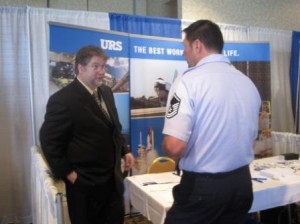INSIDE THE 
NEWS + ADVICE
3 Interviewing Tips for Transitioning Military
 Many military members have difficulty in interviews. In various programs, I have heard those who were sure that they were “too intense” for civilians when interviewing and those who worried about whether they could answer questions effectively.
Many military members have difficulty in interviews. In various programs, I have heard those who were sure that they were “too intense” for civilians when interviewing and those who worried about whether they could answer questions effectively.
In mock interviews with transitioning military many coaches find few who can present their skills and knowledge in terms the hiring manager will understand. In talking with recruiters and hiring managers, this same problem is commonly mentioned.
Tip 1: Learn the Language
It is your job to translate your past into the future you want. As you study the work you seek to do next, look at the words that are used. Read a range of job ads that interest you and see what words are used most often across them. Do the same with the websites of your targeted companies. If there are professional or trade publications in your field, read those as well.
Then take your military experience and write out your achievements using the words you have seen most often used in your research. Practice answering questions using those words. Unless you are interviewing with a defense contractor and will be doing the same job you did in the military, learn to answer questions without any use of military terms or acronyms.
Tip 2: Learn What Your Target Organizations Value
You know the mission of your service and the units you served in. Now you need to learn the mission and values of each organization you are considering working with. Sure it is easy to say that all companies focus on profits and revenue or charities focus on a cause. But that is quite superficial. When you look at your target employers, their websites and job postings will provide information about the mission, goals, and values which are important to them. If you want to work there, these should be things which also matter to you.
Interviews are not really about you as much as they are about what you will do to solve critical problems the organization faces.
Once you know what an organization sees as its mission and values, you can weave these into both your response to questions and into questions you will ask in interviews.
Example: Engility’s homepage says:
• Engility: Your Mission. Our Commitment.
• Built for Today. Designed for Tomorrow.
• Speed. Agility. Innovation. Driving the new model for government services.
These are just the first few lines but they provide the first indication of what Engility sees as their mission and what they value. You would then focus on the specific part of Engility which interested you and learn what else they say is important.
Your answers to interview questions would include some which reference the mission and values in the context of your experience and interests. Then you might ask questions to see how these are actually demonstrated in the job and unit you are considering.
Tip 3. Drop Your Fears
Are there hiring managers who are not interested in hiring veterans? Of course! But when you are selected for an interview, it means that they are actively interested in you for the position. No one wastes time on interviewing people they will not consider hiring. Yet I regularly see military members who ‘read’ bias into quite standard interview questions. Recently one took offense because the recruiter kept asking him questions for an hour, in what had been scheduled as a 20-minute screening interview, and kept asking for more details to understand the experience being described. Yet this guy thought that was an indication of anti-military bias. Let me assure you, no civilian who could not clearly answer questions would have gotten more than 10 minutes! And any intensity, demonstrated by your focus in answering interview questions with relevant details and interest in the target’s work and culture, is a positive.
Control your fears by doing your research and networking checks while developing your targets list. You want to ensure it is an employer who will offer you the right place to succeed before you apply and interview!
Control fears further by understanding that you are in competition with many other people for any job. It is your unique experience, clearly communicated in terms the employer understands and values, which demonstrates why you should be the one who gets the job.
 Patra Frame is ClearedJobs.Net’s HR Consultant. She is an experienced human resources executive and founder of Strategies for Human Resources. Patra is an Air Force veteran and charter member of the Women in Military Service for America Memorial. Follow Patra on Twitter @2Patra.
Patra Frame is ClearedJobs.Net’s HR Consultant. She is an experienced human resources executive and founder of Strategies for Human Resources. Patra is an Air Force veteran and charter member of the Women in Military Service for America Memorial. Follow Patra on Twitter @2Patra.


Great article Patra, thank you. I am presenting on a similar subject and wonder if I might be able to speak with you.
Chris, easiest way to contact me directly is through my website: http://www.PatraFrame.com Happy to help if I can.